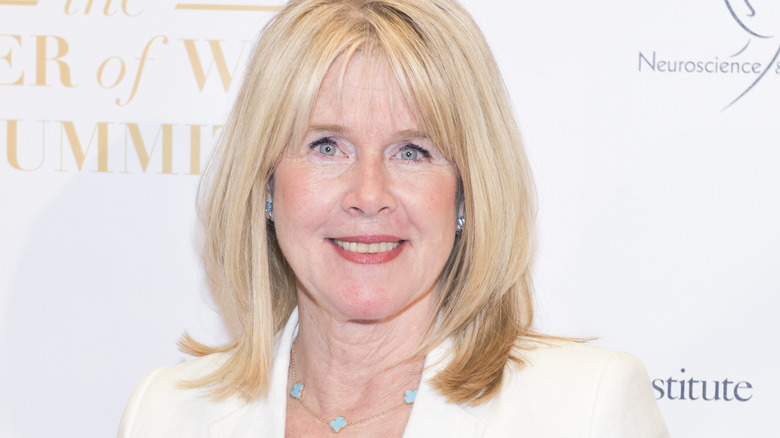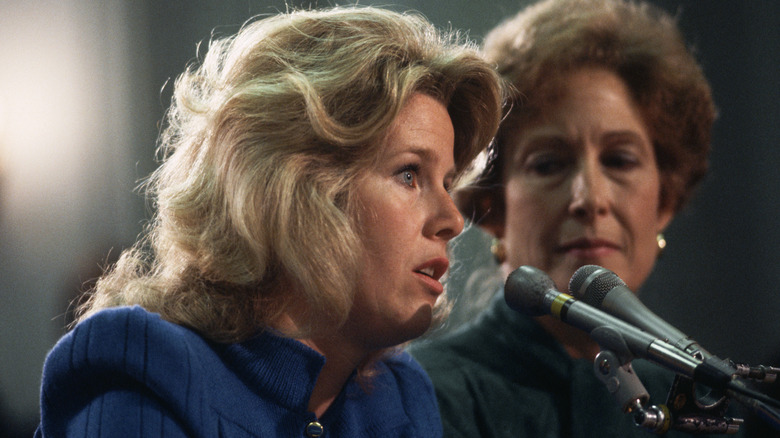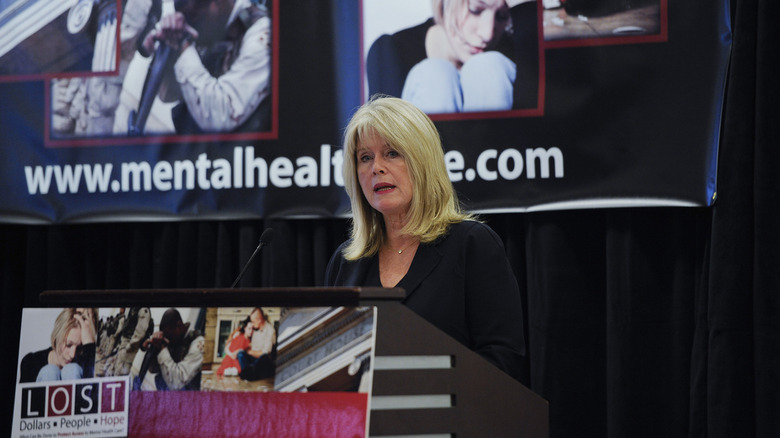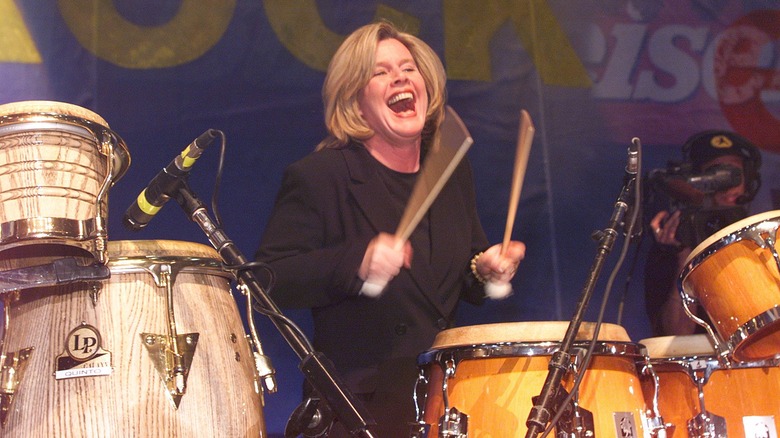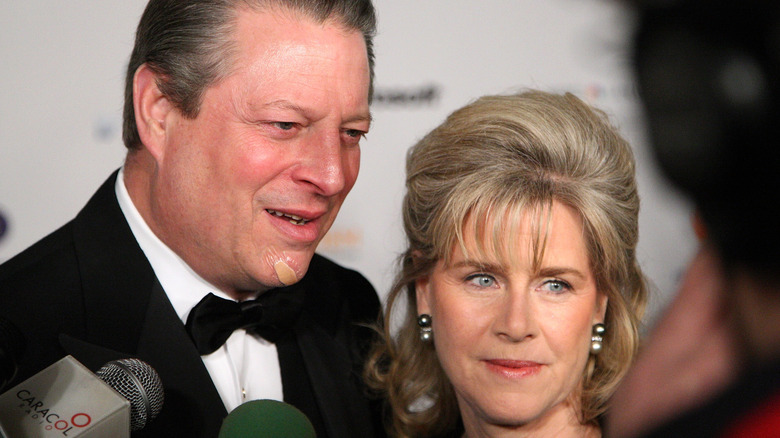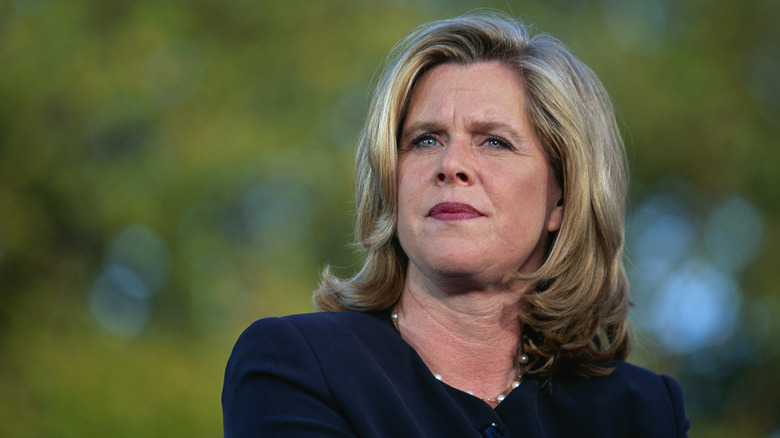Whatever Happened To Tipper Gore?
We may receive a commission on purchases made from links.
Folks who were hanging around in the 1990s will definitely recognize the name Tipper Gore, if only because of that recognizable first name. Born Mary Elizabeth Aitcheson in 1948, Tipper — as her mother nicknamed her — originally came into public notoriety through her husband, Al Gore, who served as Bill Clinton's vice president from 1993 to 2001. And while Al ran for president against George W. Bush in the subsequent election and turned his attention toward environmental issues, Tipper struck out on her own into a variety of domains: music, photography, mental and physical health, and more.
Then again, Tipper Gore had always had an interest in psychological issues. She received her bachelor's degree in psychology the same year that she and Al got married, 1970, and got her master's degree in 1975 leading up to Al's congressional appointment the following year. She helped establish the Congressional Wives Task Force in the late '70s and the Parents' Music Resource Center (PMRC) in the mid-80s, both of which turned their attention to shielding children from questionable content in the media.
It's likely that many folks first encountered Tipper during the resultant congressional trials that featured testimony from musicians like Frank Zappa and Dee Snyder. The trials focused on the PMRC's rating system, which ultimately led to the now-infamous Parental Advisory stickers on records (one of the many times the government went to war with music). Tipper has kept busy since then, refocusing her attention on mental health issues, indulging in her love for photography and music, advocating for gay rights by doing things like opposing Proposition 8 in California, and enjoying her role as mother and grandmother.
Tipper Gore started the Parents Music Resource Center
Most people are going to remember Tipper Gore for her time with the Parents Music Resource Center (PMRC). Formed in 1985 by four women connected to politics, the PMRC set out to censor music, and it became one of the biggest music scandals of the 1980s. During the 1985 Senate hearings on the topic, PMRC co-founder Susan Baker said they focused on lyrics that are "sexually explicit, excessively violent, or glorify the use of drugs and alcohol," The American Yawp quotes her. The PMRC even compiled a list of groups that they found especially objectionable, like Judas Priest, Prince, and Twisted Sister dubbed the "Filthy 15." Prince's "Darling Nikki" proved particularly distressing to Gore.
As expected, musicians took up arms against the PMRC and testified en masse before the Senate. Legendary avant-garde musician Frank Zappa delivered perhaps the most well-framed refutation of the PMRC's goals (per Urbigenous Library): "The PMRC proposal is an ill-conceived piece of nonsense which fails to deliver any real benefits to children, infringes the civil liberties of people who are not children and promises to keep the courts busy for years ... the PMRC's demands are the equivalent of treating dandruff by decapitation." The hearings resulted in the creation of the Parental Advisory sticker.
Gore left the PMRC in 1993 but still thinks well of her time there. "Music is a universal language that crosses generations, race, religion, sex and more," she told Rolling Stone in 2015. "Never has there been more need for communication and understanding on these issues as there is today."
She's an advocate for mental health
In addition to her time with the Parents' Music Resource Center (PMRC), Tipper Gore has been a long-time mental health advocate going back to the 1980s. In 1999, she conducted the first White House conference on mental health, where she talked about how she used to receive treatment for depression. That year she started the National Mental Health Awareness Campaign (NMHAC), devoted to breaking taboos and silence regarding mental health, which is the first step toward care and recovery.
In 2017, Gore stepped back into the mental health sphere when she donated $1 million to the National Alliance on Mental Illness (NAMI). As The Washington Post quoted her, she felt compelled to get involved because "we're at a critical juncture where health care is concerned." Specifically, she criticized inadequacies in the Affordable Care Act that "will hurt the poor and the vulnerable, and the middle class." She also denounced President Trump for reducing the budget of the Substance Abuse and Mental Health Services Administration (SAMHSA).
In 2019, Gore spoke at the Brain & Behavior Research Foundation. There, she echoed her refrain from two decades prior in a talk entitled "Breaking the Silence About Mental Illness." That same year, she showed up in interviews with news outlets like King 5 in Seattle. There, she talked about a host of mental health issues, including stigmas, terminology used to describe the mentally ill, the U.S.' ongoing opioid crisis, and more.
She's passionate about music and photography
Tipper Gore's interest in music and the arts extends beyond moral sensibilities and her time with the Parents Music Resource Center (PMRC). She was actually in a band, the Wildcats, when she was younger. In an interview with Tom Tom Mag, she says that the four-person, all-girl group took inspiration from the Beatles and started in school. "I was enjoying the guitar. ... and I'm not the best singer in the world ... So then I switched to the drums seriously and my friends would play the guitar and bass," she said. "We named our band after my mother's Buick Wildcat." They mostly did covers and played at festivals, school, and even some political rallies.
Gore also has a lifelong love of photography. Far from being a mere hobby, however, she sold some of her photos to The Tennessean and the Associated Press, as the Montecito Journal shows. She loved this work so much that it was a toss-up between photography and politics. Much like some of her other ventures, Gore's photography often adopted an activist or political slant. She often used homeless people as subjects for her photos to highlight the difficulties they face and even published a photo essay book in 1996 called "Picture This." Over the years, Gore has continued to photograph, if informally. She's turned to nature and animal shots in locations like Yellowstone National Park or the wide expanses of Wyoming, as well as candid shots of everyday life while traveling abroad.
Tipper and Al Gore are no longer together
Despite the connection to former Vice President Al Gore, folks might be surprised to learn that he and Tipper haven't been together since 2010. They separated that year after reaching their 40th wedding anniversary. And we say "separated" because this is the term that Al and Tipper used in a joint statement. "We are announcing today that after a great deal of thought and discussion, we have decided to separate," they wrote, per ABC News. "This is very much a mutual and mutually supportive decision that we have made together following a process of long and careful consideration. We ask for respect for our privacy and that of our family, and we do not intend to comment further." Outlets like Psych Central and Time talk about divorce, but there's no indication that Tipper and Al ever legally divorced. And then there's Tipper's continued use of the "Gore" surname.
There's plenty of conjecture about why the two separated, though neither Tipper nor Al have spoken about it at length. "We've simply grown apart," Psych Central quotes them. Other sites offer typical, even cliché, explanations of couples married a long time: They grew apart, the magic is gone, the kids grew up, etc. Regardless, Tipper and Al still share four children and are still involved in their lives. As Knoxville News Sentinel says, the kids even bring their parents together for holidays and family occasions. "I'm enjoying where I am and particularly that I'm a grandmother," Tipper Gore said.
Tipper Gore is a supporter of gay rights
While there's a lot more we could say about Tipper Gore, we're going to end on another issue that she's weighed in on over the years: Gay rights and issues impacting LGBTQ+ individuals. Way back in 1993, she participated in AIDS walks to raise money for a cure. "We will continue to walk until the last mile is reached and the cure for AIDS is found," she said at the time, per Los Angeles Times. Later, In 2000, she showed up at public events alongside her husband, Al, at gay rights marches and speaking to the parents of gay children. While she was light on specifics, she talked about "unconditional love" and even busted out the drums to play a bit. "I was asked to do it and I believe in the cause," she said, per The New York Times.
After her time in the political limelight ended, Gore continued to make public appearances in support of gay rights here and there. In 2008, she showed up at the Los Angeles Gay and Lesbian Center's anniversary dinner speaking in opposition to Proposition 8, a voter-driven movement intended to overturn gay marriage in California. "The Gore family is a part of your family right now," Advocate quotes her, adding, "This is a struggle that must be won." In 2011, she attended a fundraiser for GetEqual, a now-defunct non-profit organization responsible for staging protests against policies like the U.S. military's hush-hush "Don't Ask, Don't Tell" rule regarding non-heterosexual people in the armed services.
If you or someone you know needs help with mental health, please contact the Crisis Text Line by texting HOME to 741741, call the National Alliance on Mental Illness helpline at 1-800-950-NAMI (6264), or visit the National Institute of Mental Health website.
